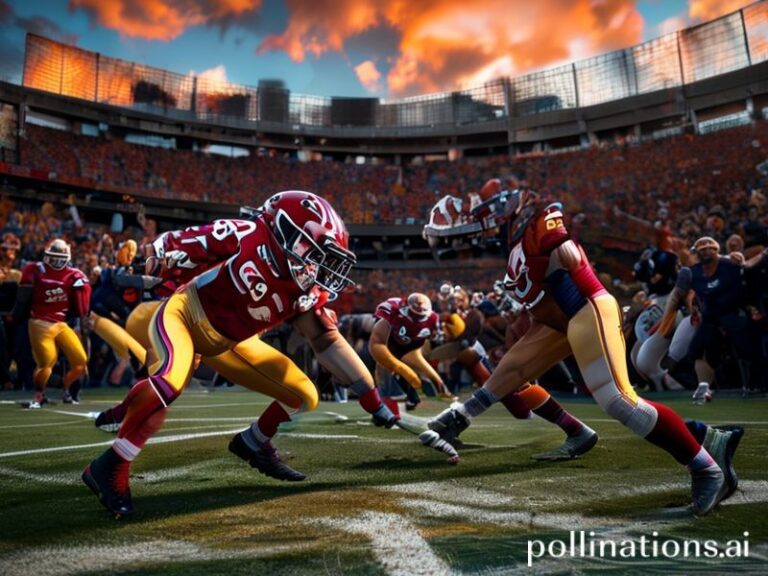Braves vs Tigers: How a Georgia Baseball Game Quietly Bankrolls Submarines, NFTs, and Global Supply Chains
Rome once pitted lions against Christians; the Aztecs let jaguars snack on POWs; today we settle the primal score between striped predator and feathered warrior on a baseball diamond in Cobb County, Georgia. Welcome to Braves vs. Tigers, the latest episode in humanity’s endless quest to rebrand carnage as family entertainment while keeping concession margins healthy.
From the banks of the Mekong to the glass towers of Dubai, the world watches—well, “watches” if you count the 0.7 Nielsen share in Jakarta—because this is America’s pastime: exporting a sport it increasingly ignores to nations too polite to decline. MLB International beams the contest into Seoul’s 4 a.m. darkness, where bleary-eyed salarymen wonder why Atlanta’s mascot is a screaming Native American caricature while Detroit’s is a literal man-eater. Cultural sensitivity, it turns out, is a sliding scale: one team’s iconography is a lawsuit waiting to happen, the other’s is a Detroit marketing intern’s fever dream of 1980s cocaine excess.
The geopolitics are exquisite. Chipotle sponsors the Braves’ dugout; its carnitas are sourced from the same hemisphere that supplies Detroit’s motor belts. Every stolen base is quietly underwritten by a lithium mine in Chile, so when Ronald Acuña swipes second, somewhere in the Atacama a child’s future asthma attack is already scheduled. Meanwhile, Tigers slugger Spencer Torkelson swings lumber harvested from Canadian forests, felled to make paper for the very NFT tickets now scalped on Telegram channels in Istanbul. Nothing says “Americana” quite like a supply chain that circumnavigates the globe twice before first pitch.
Bookmakers in Macau have installed Atlanta as slight favorites, which means the Communist Party’s offshore revenue service is already calculating how many leaky nuclear submarines it can fund off middle-in fastballs. European crypto exchanges list a real-time tokenized prop bet on whether the game exceeds 2.5 hours—because nothing screams decentralization like wagering Satoshis on the pace of a sport where 90 seconds of action require fourteen pitching changes and three mound visits by a catcher who speaks fluent analytics but still can’t throw to second.
Across the Atlantic, the BBC live-blog struggles to explain why the seventh-inning stretch involves 45,000 people singing about peanuts and Cracker Jack while inflation gnaws at their 401(k)s. A Berlin think tank issues a 42-page white paper titled “Baseball as Late-Stage Capitalism: A Lacanian Reading of the Bullpen Phone.” It receives glowing reviews from people who have never seen a curveball but feel seen by its Derridean implications.
Back in the ballpark, the jumbotron flashes a salute to “our troops overseas,” a gesture as bipartisan as drone warfare. Somewhere in Djibouti, a 19-year-old gunner from Valdosta misses the replay because the Armed Forces Network is buffering. He’ll catch the highlights tomorrow, between guard shifts protecting the very shipping lanes that will bring tomorrow’s bobbleheads to SunTrust—sorry, Truist—Park. Branding, like empires, is fluid.
And yet, for all the global scaffolding, the contest still boils down to something stubbornly human: a man with a stick trying to outwit a man with a rock. Strip away the cryptocurrency, the ESG reports, the bilingual K-pop remix of “Take Me Out to the Ball Game,” and you have two teams of mercenaries paid obscene sums to play a children’s game while fans gamble rent money on whether the lefty specialist can retire a .198 hitter. If that isn’t the perfect metaphor for 2024, I don’t know what is.
When the final out lands in Riley Greene’s glove—spoiler alert: Detroit’s bullpen is still Detroit’s bullpen—the scoreboard will freeze, the stadium lights will dim, and the planet will rotate uncaring toward the next manufactured drama. But somewhere a container ship steams toward Savannah carrying tomorrow’s giveaway tomahawks, and the cycle resumes. Because the real international pastime isn’t baseball; it’s pretending the absurd is inevitable. Play ball, Earth.







